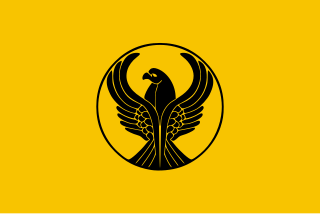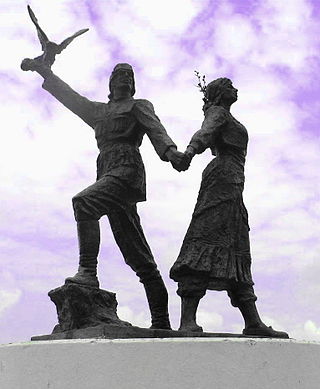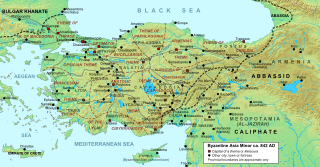The Greeks are an ethnic group native to Greece.
The term Greeks also has several inclusive meanings:
The term may also refer to:
Greek may refer to:

The Greeks or Hellenes are an ethnic group and nation indigenous to Greece, Cyprus, southern Albania, Anatolia, parts of Italy and Egypt, and to a lesser extent, other countries surrounding the Eastern Mediterranean and Black Sea. They also form a significant diaspora, with many Greek communities established around the world.

Trabzon, historically known as Trebizond, is a city on the Black Sea coast of northeastern Turkey and the capital of Trabzon Province. Trabzon, located on the historical Silk Road, became a melting pot of religions, languages and culture for centuries and a trade gateway to Persia in the southeast and the Caucasus to the northeast. The Venetian and Genoese merchants paid visits to Trabzon during the medieval period and sold silk, linen and woolen fabric. Both republics had merchant colonies within the city – Leonkastron and the former "Venetian castle" – that played a role to Trabzon similar to the one Galata played to Constantinople. Trabzon formed the basis of several states in its long history and was the capital city of the Empire of Trebizond between 1204 and 1461. During the early modern period, Trabzon, because of the importance of its port, again became a focal point of trade to Persia and the Caucasus.
Modern Greek, generally referred to by speakers simply as Greek, refers collectively to the dialects of the Greek language spoken in the modern era, including the official standardized form of the languages sometimes referred to as Standard Modern Greek. The end of the Medieval Greek period and the beginning of Modern Greek is often symbolically assigned to the fall of the Byzantine Empire in 1453, even though that date marks no clear linguistic boundary and many characteristic features of the modern language arose centuries earlier, beginning around the fourth century AD.
Macedonian most often refers to someone or something from or related to Macedonia.

Greek art began in the Cycladic and Minoan civilization, and gave birth to Western classical art in the subsequent Geometric, Archaic and Classical periods. It absorbed influences of Eastern civilizations, of Roman art and its patrons, and the new religion of Orthodox Christianity in the Byzantine era and absorbed Italian and European ideas during the period of Romanticism, until the Modernist and Postmodernist. Greek art is mainly five forms: architecture, sculpture, painting, pottery and jewelry making.
Pontic Greek is an endangered variety of Modern Greek indigenous to the Pontus region on the southern shores of the Black Sea, northeastern Anatolia, and the Eastern Turkish/Caucasus region. Today it is spoken mainly in northern Greece. Its speakers are referred to as Pontic Greeks or Pontian Greeks. It is not completely intelligible with modern Demotic Greek.

The Pontic Greeks, also Pontian Greeks or simply Pontians, are an ethnically Greek group indigenous to the region of Pontus, in northeastern Anatolia. Many later migrated to other parts of Eastern Anatolia, to the former Russian province of Kars Oblast in the Transcaucasus, and to Georgia in various waves between the Ottoman conquest of the Empire of Trebizond in 1461 and the Russo-Turkish War of 1828–1829. Those from southern Russia, Ukraine, and Crimea are often referred to as "Northern Pontic [Greeks]", in contrast to those from "South Pontus", which strictly speaking is Pontus proper. Those from Georgia, northeastern Anatolia, and the former Russian Caucasus are in contemporary Greek academic circles often referred to as "Eastern Pontic [Greeks]" or as Caucasian Greeks, but also include the Turkic-speaking Urums.
Greek Muslims, also known as Grecophone Muslims, are Muslims of Greek ethnic origin whose adoption of Islam dates to the period of Ottoman rule in the southern Balkans. They consist primarily of the descendants of the elite Ottoman Janissary corps and Ottoman-era converts to Islam from Greek Macedonia, Crete, and northeastern Anatolia and the Pontic Alps. They are currently found mainly in the west of Turkey and the northeast.

Gümüşhane is a city in the Black Sea Region of Turkey. It is the seat of Gümüşhane Province and Gümüşhane District. Its population is 39,214 (2022). The city lies along the Harşit River, about 40 miles (64 km) southwest of Trabzon. The city lies at an elevation of 1,153 m (3,783 ft).
Greek traditional music includes a variety of Greek styles played by ethnic Greeks in Greece, Cyprus, Australia, the United States and other parts of Europe. Apart from the common music found generally in Greece, each region of Greece contains a distinct type of folk music that originated from the region due to their history, traditions and cultural influences.

Fatsa is a town and a district of Ordu Province in the central Black Sea region of Turkey. Population from Fatsa is more than 115,000.

The Laz people, or Lazi, are a Caucasian ethnic group native to the South Caucasus, who mainly live in Black Sea coastal regions of Turkey and Georgia. They traditionally speak the Laz language which is a member of the Kartvelian language family but has experienced a rapid language shift to Turkish.
The Urums are several groups of Turkic-speaking Greek Orthodox people in Crimea and Georgia.

The Greeks in Georgia, which in academic circles is often considered part of the broader, historic community of Pontic Greeks or—more specifically in this region—Caucasus Greeks, is estimated at between 15,000 and 20,000 people to 100,000 down from about 100,000 in 1989. The community has dwindled due to the large wave of repatriation to Greece as well as emigration to Russia, and in particular Stavropol Krai in the North Caucasus region of southern Russia. The community has established the Union of Greeks in Georgia and there is a Cultural Centre and a newspaper entitled Greek Diaspora.

Greeks have been present in what is now southern Russia from the 6th century BC; those settlers assimilated into the indigenous populations. The vast majority of contemporary Russia's Greek minority populations are descendants of Medieval Greek refugees, traders, and immigrants from the Byzantine Empire, the Ottoman Balkans, and Pontic Greeks from the Empire of Trebizond and Eastern Anatolia who settled mainly in southern Russia and the South Caucasus in several waves between the mid-15th century and the second Russo-Turkish War of 1828–29. As during the Genocide of the Pontic Greeks, the survivors fled to the Upper Pontus.

Chaldia was a historical region located in the mountainous interior of the eastern Black Sea, northeast Anatolia. Its name was derived from a people called the Chaldoi that inhabited the region in antiquity. Chaldia was used throughout the Byzantine period and was established as a formal theme, known as the Theme of Chaldia, by 840. During the Late Middle Ages, it formed the core of the Empire of Trebizond until its fall to the Ottoman Empire in 1461.

Eastern Orthodox Christianity is today the religion of only a minority in Turkey. It was once the dominant religion, during the time of the Byzantine Empire, as the region that comprises Turkey today was a central part of the Byzantine heritage. Today, less than one tenth of one percent of the population are Orthodox Christians. The provinces of Istanbul and Hatay, which includes Antakya, are the main centers of Christianity in Turkey, with comparatively dense Christian populations, though they are minorities in these areas. The traditional variant of Orthodox Christianity present in Turkey is the Eastern Orthodox branch, focused mainly in the Greek Orthodox Church.
The Anatolian Greeks, also known as Asiatic Greeks or Asia Minor Greeks, make up the ethnic Greek populations who lived in Anatolia from 1200s BCE as a result of Greek colonization until the forceful population exchange between Greece and Turkey in 1923, though some communities in Anatolia survive to the present day.